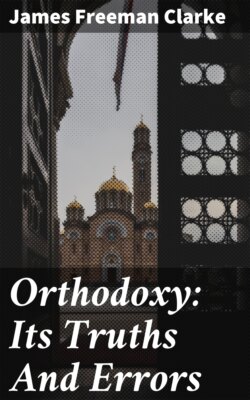Читать книгу Orthodoxy: Its Truths And Errors - James Freeman Clarke - Страница 10
На сайте Литреса книга снята с продажи.
§ 7. The three Tendencies in the Church.
ОглавлениеTable of Contents
The human soul, a unit, indivisible, and without parts, nevertheless acts in three directions—of will, affection, intellect. These are distinguishable, though not divisible. Every one knows the difference between an act; an emotion of anger, pity, sorrow, love; and a process of logic, or an intellectual argument. These are the three primary states of the mind, evidently distinct. It is impossible to mistake either for the other. I may direct my mind towards action, towards thought, or towards emotion. The first of these, action, is the most within my own power, depends chiefly on myself, lies nearest the will. Will passes instantaneously into action. I will to lift my arm, and it is done. On the other hand, feeling or emotion lies the farthest from this centre of will, depends least of all on my own choice, and in it I am most passive. But the sphere of intellect is intermediate. I am more free when I think than when I feel; less free than when I act. In the domain of will, I act upon external things; in the domain of feeling, I am acted upon by external things; in the domain of intellect, I neither act nor am acted upon, but I see them. In all thinking, in proportion as it is pure thought, both will and emotion are excluded. We are neither actors nor sufferers, but spectators. Things seen pass into our life through the intellect, and become sources of emotion and action. Love of truth causes us to desire to know it; this desire leads us to put our mind in the presence of truth, but when there, the functions of emotion and will cease, and all we have to do is to look.
Now, there have always been in the Church three parties, or at least three tendencies, in regard to the basis of religion. [pg 027] One of these makes the basis of the religious life to consist in thought, one posits it in feeling, the third in action. With one, the intellect must take the initiative; with the second, the heart; with the third, the will, or power of determination. The three parties in the Church, based on these three tendencies, may be characterized as the Orthodoxists, the Emotionalists, and the party of Works. The first says, “We are saved by faith;” the second says, “We are saved by love;” the third says, “We are saved by obedience.” The first assumes that the sight of truth must take the lead in all Christian experience; the second believes that love for goodness is the true basis in religion; the third maintains that the first thing to be done, in order to become a religious man, is to obey the law of duty. It is evidently very important to decide which of these answers is the true one. What are we to do first, if we wish to become Christian men or women? Are we to study, read, reflect, in order to know the truth? Are we to go to church and listen to sermons, join Bible classes and study the Scriptures, read compends of doctrine and books of Christian evidence? Or are we to seek for emotion, to pray for a change of heart, to put ourselves under exciting influences, to go where a revival is in progress, to attend protracted meetings, to be influenced through sympathy till we are filled full of emotions of anxiety, fear, remorse, followed by emotions of hope, trust, gratitude, pardon, peace, joy? Or are we to do neither of these things, but to begin by obedience, trying to do right in order to be right, beginning by the performance of the humblest duties, the nearest duties, letting fidelity in the least open the way to more? Shall we know the truth in order to love it and do it? Or shall we love the truth in order to see it and do it? Or shall we do right in order to know it and love it?
Large numbers in the Church have followed each of these three methods, and made each the basis of its action. One [pg 028] has said, “We are saved by works;” a second, “We are saved by faith;” a third, “We are saved by love.”
